The Front Page
The Front Page is a Broadway comedy about newspaper reporters on the police beat. Written by former Chicago reporters Ben Hecht and Charles MacArthur, it was first produced in 1928 and has been adapted for the cinema several times. The play's copyright is set to expire in 2024 in the United States, and subsequently the play will enter the public domain.
| The Front Page | |
|---|---|
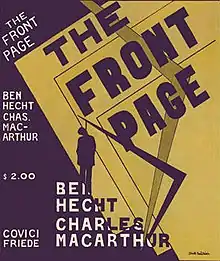 First edition 1928 | |
| Written by | |
| Date premiered | August 14, 1928 |
| Place premiered | Times Square Theater New York City |
| Original language | English |
| Genre | Comedy |
| Setting | The Press Room of the Criminal Courts Building in Chicago, 1928 |
Plot
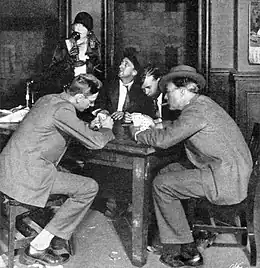
The play's single set is the dingy press room of Chicago's Criminal Courts Building, overlooking the gallows behind the Cook County Jail. Reporters from most of the city's newspapers are passing the time with poker and pungent wisecracks about the news of the day. Soon they will witness the hanging of Earl Williams, a white man and supposed Communist revolutionary convicted of killing a black policeman. Hildy Johnson, cocky star reporter for the Examiner, is late. He appears only to say goodbye; he is quitting to get a respectable job and be married. Suddenly the reporters hear that Earl Williams has escaped from the jail. All but Hildy stampede out for more information. As Hildy tries to decide how to react, Williams comes in through the window. He tells Hildy he is no revolutionary, and that he shot the police officer by accident. The reporter realizes this bewildered, harmless little man was railroaded — just to help the crooked mayor and sheriff pick up enough black votes to win re-election. It is the story of a lifetime. Hildy helps Williams hide inside a roll-top desk. His daunting challenge now is to get Williams out of the building to a safe place for an interview before rival reporters or trigger-happy policemen discover him. Hildy has no choice but to ask for help from Walter Burns, managing editor of the Examiner — a devious tyrant who would do just about anything to keep Hildy with the newspaper.
Production
The Front Page was produced by Jed Harris and directed by George S. Kaufman, with settings by Raymond Sovey. It opened at the Times Square Theatre, New York City, on August 14, 1928, and ran 278 performances before closing in April 1929.[1]
Cast
- Vincent York as Wilson, American[2]
- Allen Jenkins as Endicott, Post[2]
- Willard Robertson as Murphy, Journal[2]
- William Foran as McCue, City Press[2]
- Tammany Young as Schwartz, Daily News[2]
- Joseph Calleia as Kruger, Journal of Commerce[2]
- Walter Baldwin as Bensinger, Tribune[2]
- Violet Barney as Mrs. Schlosser[2]
- Jay Wilson as "Woodenshoes" Eichorn[2]
- Eduardo Ciannelli as Diamond Louis[2]
- Lee Tracy as Hildy Johnson, Herald-Examiner[2]
- Carrie Weller as Jennie[2]
- Dorothy Stickney as Molly Malloy[2]
- Claude Cooper as Sheriff Hartman[2]
- Frances Fuller as Peggy Grant[2]
- George Barbier as The Mayor[2]
- Frank Conlan as Mr. Pincus[2]
- George Leach as Earl Williams[2]
- Osgood Perkins as Walter Burns[2]
- Matthew Crowley as Carl[2]
- Gene West as Frank[2]
- Larry Doyle as a Policeman[2]
- George T. Fleming as a Policeman[2]
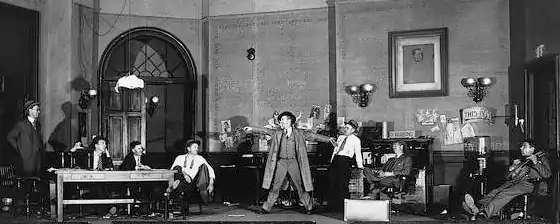 The press room of the Chicago Criminal Courts Building
The press room of the Chicago Criminal Courts Building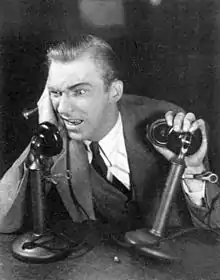 Lee Tracy as Hildy Johnson
Lee Tracy as Hildy Johnson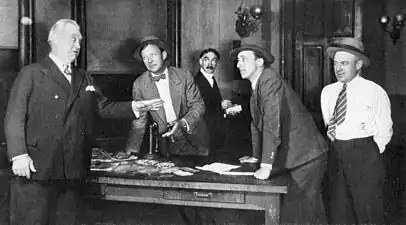 George Barbier (The Mayor), Willard Robertson (Murphy), Claude Cooper (Sheriff Hartman), Allen Jenkins (Endicott), William Foran (McCue)
George Barbier (The Mayor), Willard Robertson (Murphy), Claude Cooper (Sheriff Hartman), Allen Jenkins (Endicott), William Foran (McCue)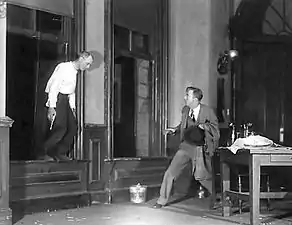 George Leach (Earl Williams), Lee Tracy (Hildy Johnson)
George Leach (Earl Williams), Lee Tracy (Hildy Johnson)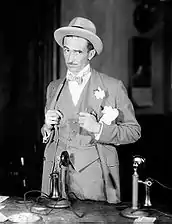 Osgood Perkins as Walter Burns
Osgood Perkins as Walter Burns
Significance
The authors' expert plotting and rapid-fire, streetwise dialogue delighted audiences and made their play an instant classic. Hecht and MacArthur strongly influenced many other American comic writers, especially in Hollywood. In the 1970s, film producer Dore Schary told film historian David Bordwell that The Front Page influenced studio writers and directors in the 1930s.[3] The play popularized the image of American journalists as fast-talking, wisecracking "hard-boiled" types, excessively fond of alcohol and hard living in general, who would go to any lengths to get a story on the front page of their newspapers.[4]
The newspapers are modeled on the City News Bureau of Chicago (where MacArthur had worked), Chicago Daily News (where Hecht was a reporter), and William Randolph Hearst's Chicago's American. The character Earl Williams is loosely based on "Terrible" Tommy O'Connor.[5] The character of Williams also was at least partially based on the case of Thomas Mooney, a radical leftist sentenced to death on the basis of questionable evidence. Walter Burns is a thinly disguised caricature of Hearst editor Walter Howey.[6] The corrupt Mayor of Chicago seems to have been based on William Hale Thompson, who, like the mayor in the play, depended in part upon black voters to stay in office. Commenting on the play's seeming veracity, New York Times theater critic Brooks Atkinson wrote, "no one who has ground his heels in the grime of a police headquarters press room will complain that this [play's] argot [dialogue] misrepresents the gentlemen of the press."[7]
Revivals
The play was restaged four more times on Broadway. The 1969–70 revival was the most successful of these. It was produced at the Ethel Barrymore Theatre and starred Robert Ryan and Bert Convy as Burns and Johnson, running for a total of 222 performances.[8] The 1946 revival was directed by Charles MacArthur and ran for 79 performances. The 1986–87 revival was produced at the Vivian Beaumont at Lincoln Center, directed by Jerry Zaks and starred Richard Thomas as Hildy and John Lithgow as Burns. This production ran for 57 performances.[9]
A Broadway revival opened at the Broadhurst Theatre, in a limited engagement, starting on September 20, 2016, in previews and officially on October 20. Directed by Jack O'Brien, the cast starred Nathan Lane as Walter Burns, John Slattery as Hildy Johnson, John Goodman as Sheriff Hartman, Jefferson Mays as Bensinger, Holland Taylor as Mrs. Grant, Sherie Rene Scott as Mollie Malloy, Robert Morse as Silas Pinkus, and Christopher McDonald as Murphy. The production received generally good notices, especially for Lane, and became the first show of the season to recoup and turn a profit.[10][11][12] It received two Tony nominations: Best Featured Actor in a Play (Lane) and Best Scenic Design of a Play (Douglas W. Schmidt).[13]
John Guare's theatrical adaptation of the film His Girl Friday was produced at The La Jolla Playhouse in San Diego, California, in 2013, directed by Christopher Ashley.[14]
Adaptations
The Front Page has been adapted for film and radio a number of times:
- The Front Page (1931), directed by Lewis Milestone, starring Adolphe Menjou and Pat O'Brien.[15]
- The 1931 film was presented as a one-hour radio adaption on June 28, 1937, by Lux Radio Theatre, starring Walter Winchell and James Gleason.[16]
- His Girl Friday (1940), directed by Howard Hawks, starring Cary Grant as Walter and Rosalind Russell as Hildy, who in this version is a woman and Walter's ex-wife. A romantic element is added to the plot, as Walter is trying to win Hildy back both professionally and personally.[15]
- The 1931 film was adapted for radio on June 22, 1946, by Academy Award Theater, with Menjou and O'Brien reprising their roles from the film.[17]
- A 1948 radio series titled The Front Page and based loosely on the play ran on the American Broadcasting Company (ABC) network.[18] It starred Dick Powell and William Conrad.
- The Front Page (1949), CBS Television series, starring John Daly and Mark Roberts.[19]
- The Front Page (1974), directed by Billy Wilder, starring Jack Lemmon and Walter Matthau.[20]
- Switching Channels (1988), starring Burt Reynolds and Kathleen Turner, with the newspaper reporters updated to television reporters and none of the original dialogue retained.[21]
His Girl Friday and Switching Channels changed the male lead Hildebrand "Hildy" Johnson to women, Hildegaard "Hildy" Johnson and Christy Colleran respectively.[21] John Varley's 1991 science fiction novel Steel Beach takes the story — and the change of sex — to another level; the plot includes a sex-change by a male reporter named Hildy Johnson.
There have also been four television productions, all under the title The Front Page:
- 1945, in the US;
- 1948, in the UK;
- 1949–1950 (see above) in the US as a series on CBS;
- 1970, in the US
The musical Windy City (book and lyrics by Dick Vosburgh, music by Tony Macaulay) was also based on The Front Page.[22] It premiered at the Victoria Palace Theatre, London, England on July 20, 1982 and ran for 250 performances.
Additionally, Hecht and MacArthur's story for the 1939 film Gunga Din recycles their basic plot of trying to dissuade someone from leaving his job, in this case Douglas Fairbanks Jr.'s character attempting to resign his post in the British army and comrades Cary Grant and Victor McLaglen conniving to prevent it.
Film critic Leonard Maltin describes the 1940 film Torrid Zone as a 3.5-out-of-4-star “variation on Front Page”.[23] Set among the highly competitive banana plantations of Central America, it stars James Cagney as the invaluable employee, Pat O'Brien as the amoral boss who will stop at nothing to keep him from leaving, George Tobias as a revolutionary awaiting the firing squad, and Ann Sheridan as love interest, with snappy dialogue provided by Richard Macaulay and Jerry Wald.[24]
The 2013 graphic novel, Nemo: Heart of Ice, by Alan Moore and Kevin O'Neill, has a prose afterword purportedly written by Hildy Johnson, who visits Lincoln Island to write about the wedding of Captain Nemo's granddaughter to the son of Robur the Conqueror.
Awards and honors
- The Front Page was included in Burns Mantle's The Best Plays of 1928–29.[25]
- The 1986 Broadway revival was nominated for two 1987 Tony Awards: Best Revival and Best Scenic Design (Tony Walton), and the Drama Desk Award for Outstanding Set Design.[26]
See also
- Chicago (play), a contemporary play that also critiques the Chicago criminal justice system
- List of United States comedy films
References
- "The Front Page". Internet Broadway Database. Retrieved 2016-09-29.
- "The Front Page". Playbill Vault. Playbill. Retrieved 2016-09-30.
- Bordwell, David (2017). Lighting Up with Hildy Johnson. His Girl Friday (Blu-ray). The Criterion Collection. Bordwell asserts this around 11:43 minutes through.
- "The Front Page". Encyclopedia.com. Retrieved 28 March 2020.
- "Hecht, Ben (1894-1964)." Encyclopedia of World Biography. Detroit: Gale, 1998. Gale U.S. History In Context. Web. 7 Apr. 2012.
- "The Press: Will the Ice Age Return?". Time. 13 August 1945 – via content.time.com.
- Sheppard, Richard K. (January 15, 1984). "Brooks Atkinson, 89, Dead; Key Voice In Drama 31 Years". The New York Times. Retrieved 23 July 2014.
- " The Front Page, 1969" Internet Broadway Database, accessed June 9, 2016
- " The Front Page 1986" Internet Broadway Database, accessed June 9, 2016
- Viagas, Robert and Gans, Andrew. "Extra, Extra: Full Cast and Theatre Announced for Broadway 'Front Page'" Playbill, June 9, 2016
- Gans, Andrew. "Starry 'Front Page' Revival Arrives on Broadway Tonight" Playbill, September 20, 2016
- Viagas, Robert. See What Critics Thought of Nathan Lane’s Broadway 'Front Page'", Playbill, October 21, 2016
- Piepenburg, Erik (May 2, 2017). "Tony Awards 2017: The Full List of Nominations". The New York Times. Retrieved February 20, 2021.
- " His Girl Friday Press Release lajollaplayhouse.org, accessed June 9, 2016
- " The Front Page, 1931" tcm.com, accessed June 9, 2016
- "Lux Radio Theatre (advertisement)". The Pittsburgh Press. 1937-06-28. p. 18. Retrieved 2020-05-26.
- "Radio Programs". The Brooklyn Eagle. 1946-06-22. p. 11. Retrieved 2020-05-26.
- Dunning, John (1998). On the Air: The Encyclopedia of Old-Time Radio (Revised ed.). New York, NY: Oxford University Press. p. 273. ISBN 978-0-19-507678-3. Retrieved 2018-11-11.
- Brooks, Tim; Marsh, Earle (24 June 2009). The Complete Directory to Prime Time Network and Cable TV Shows - 1946-Present (2007 ed.). p. 508. ISBN 978-0-345-49773-4. Retrieved 2018-11-11.
- Canby, Vincent (December 19, 1974). "Movie Review The Front Page (1974): Wilder's Uneven Film of 'Front Page'". The New York Times.
- Canby, Vincent. "Film: Turner in 'Switching Channels'" The New York Times, March 4, 1988
- Klein, Alvin. "Theater; 'The Front Page' As a Musical" The New York Times, October 20, 1985
- Maltin, Leonard (2014). Leonard Maltin's Movie Guide (2015 edition) (2015 ed.). Signet (Penguin Group). p. 245. ISBN 978-0-698-18361-2. Retrieved 2023-04-21.
- "Torrid Zone (1940) - Overview - TCM.com". Turner Classic Movies. Retrieved 2020-06-13.
- Mantle, Burns, ed. (1929). The Best Plays of 1928–29. New York: Dodd, Mead. OCLC 9695298.
- Awards ibdb.com, accessed June 9, 2016